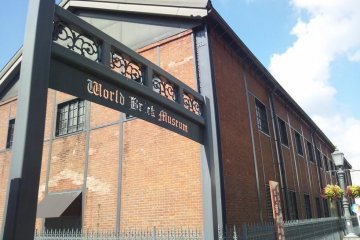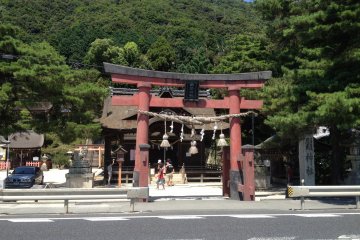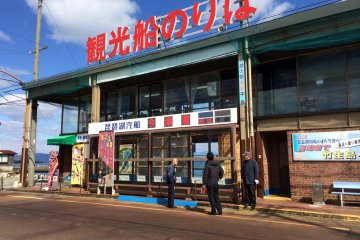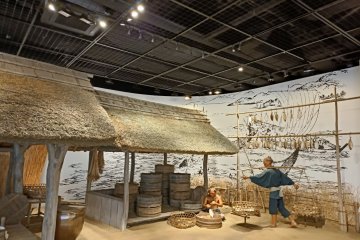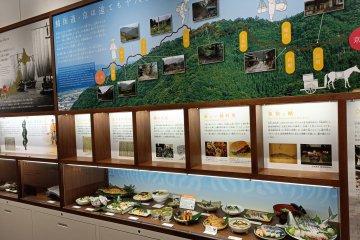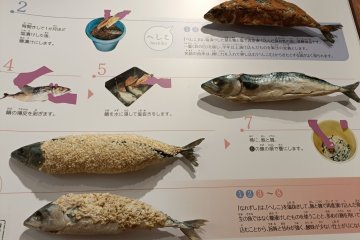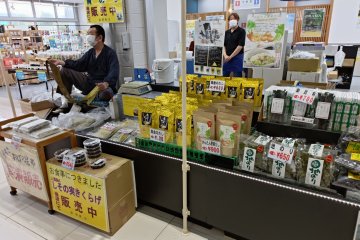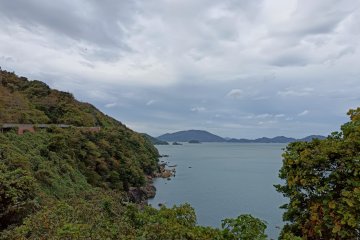Obama's Miketsukuni Wakasa Food Culture Museum, quite the mouthful, is three floors of creatively presented information on Obama's glorious past, the fishy tale as such. The town in Fukui flourished as a miketsukuni in the Edo Period (1603 – 1867), and even up to the early 20th century. From about 738, the fame of Obama's quality sea food, specifically, saba or mackerel, had been escalating, until it caught the eye or tastebuds of the Royal Court at Kyoto. They then bestowed the miketsukuni title on Obama making them Royal Purveyors, primarily of saba, to the Royal Family.

The first floor's theme is Obama's development as a coastal port on the kitamaebune trade route, eponymously named for the tall sailed merchant ships that plied the Sea of Japan coast. An exhibit of live sized wax statues of fishermen working at home is a good lead in to what their livelihoods entailed. Historic maps and photographs, as well as a cleverly varied arrangement of glass cases, show us their tasks, the processes involved, and products. What's amazing are the realistic reproduction of the products, an art known as shokuhin sampuru. We can see very fresh looking fish, an array of traditional fish products and dishes, sushi good enough to eat, all deliciously moulded, and sadly made of wax.

A marvel discovery was seeing how they managed to keep the saba in tip top condition to endure the more than 70 kilometer road journey from Obama to Kyoto. The freshly caught saba was prepared and packed first thing in the morning, then off by foot up a steep mountain top to reach Kyoto the next morning. A section highlights the route taken, known as the Saba Kado or Mackerel Road, and of course, the saba preparation, the saba itself in all its forms, again, tempting, but inedible.

A Kitchen Studio offers classes in food preparation, and up on the second floor, are the workshop areas for making lacquer chopsticks, and washi, Japanese paper, famous Wakasa products. The third floor is a public bath.
The Museum is appropriately located in Obama's Fishing Village, a happy, rowdy combination of a fresh fish market, a fish specialty shopping mall, and restaurants. The Museum stands out as a large and stark square of beige, visible from afar, a contrast between real life outside, and the origins of this life, inside.

There is more to Obama than fish. Being on the Sabo Kado to Kyoto brought in both architectural and lifestyle influences from the capital. These are in a compound of their own, known as the Sancho-machi, but also visible all around Obama. Some of the restaurants retain the traditional wooden beams hewn from a block of tree, stair cases, and cupboards.

Obama also offers a Promenade Coastal Walk. Follow the beach till you can get up on to the road and the thoughtfully placed pedestrian path by the mountains. All over Obama, too, are a multitude of shrines and temples arising from Obama's Miketsukuni Period. Popular are the Hachiman Shrine long dedicated to sea safety, and Jingu-ji, for its religiously meaningful moss-embedded grounds. A tiny museum focusses on the Saba Kado Route and its fish carriers.

The Obama Food Culture Museum, though, is something quite different. It opened in 2003, the first in Japan. It is unique in its promotion of the link between food and culture, and futuristic looking in its strong educational outreach into schools.




